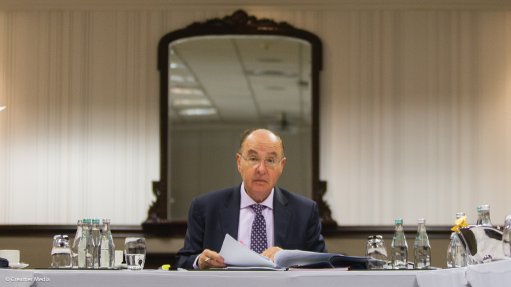
Herbert Smith Freehills partner Peter Leon
Photo by: Duane Daws
JOHANNESBURG (miningweekly.com) – The Mining Charter should be a policy type document rather than a legislative instrument.
“We need to go back to what it was intended to be,” Herbert Smith Freehills partner and Africa practice co-chair Peter Leon said on Tuesday. (Also watch attached Creamer Media video).
Speaking at a media roundtable with Herbert Smith Freehills director Patrick Leyden and associate Ben Winks, he outlined the many issues in the third iteration of the Mining Charter, which is coming under intense scrutiny as a document that confers legislative powers on the executive and thus violates the rule of law.
In addition, Winks pointed out that the Constitution was clear on the executive not being empowered to create rights and obligations.
Instead, its roles included tasks like the publishing of regulations on how obligations should be discharged, exemplified by the 2008 regulations under the Minerals and Petroleum Resources Development Act (MPRDA) laying down the forms to be used, to whom the forms should be directed and the timetables to be followed.
“That kind of thing is what the executive is constitutionally permitted to do,” Winks explained in response to Creamer Media’s Mining Weekly Online.
He pointed out that the original Mining Charter had legitimately created rights and obligations through a contract, but what had drawn unfavourable reaction was the amending of that contract in 2010 by the then Minerals Minister, in what was seen as the arrogation to her department of the power to make law.
Without renegotiation and without going through the parliamentary process, the contract had been turned into a legislative instrument.
Leon pointed out that the danger with Mining Charter Three was that it had become part of the MPRDA rather than the intended policy document of 2002, which effectively meant that the Mineral Resources Minister or the Department of Mineral Resources could change the rules overnight and create additional iterations at will.
As the situation stood, Mining Charter Three was far harsher than Mining Charter Two and “completely unworkable in its current form”, Leyden contended, adding that until all stakeholders reached agreement on the crucial ownership terms of Mining Charter Two, it was unlikely that any agreement would be reached on Mining Charter Three.
Seen as a straw in the wind, however, was this month’s apparent reversal by the National Executive Committee (NEC) of the African National Congress (ANC) of its previous stance of enforcing the Mining Charter under the MPRDA and its preparedness to abandon the long-held position of enforcing the charter as a legislative instrument.
Doing so was one of the concerns that led to President Jacob Zuma referring the MPRDA Amendment Bill back to Parliament in January 2015, which Leon said should be recognised as a positive move.